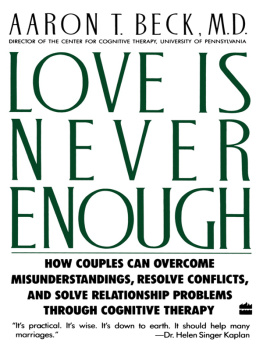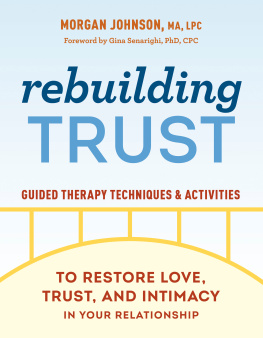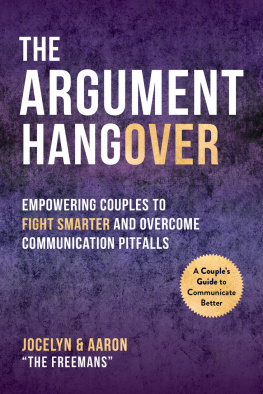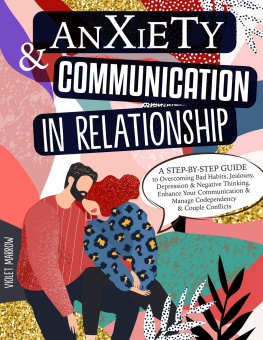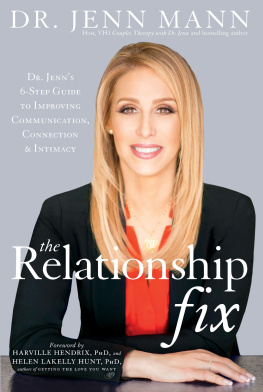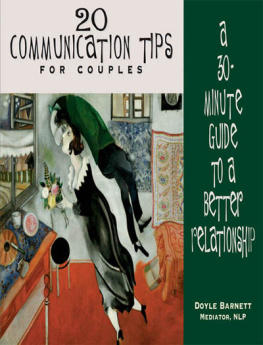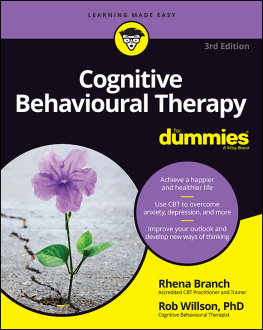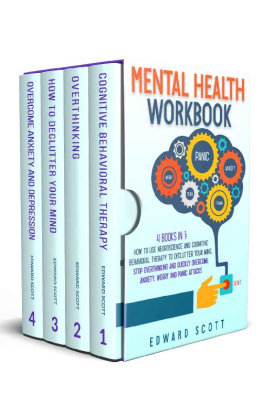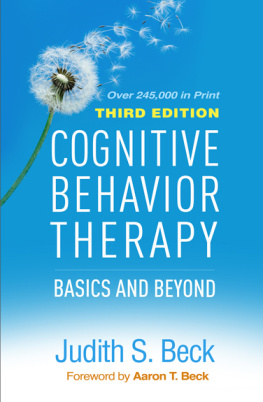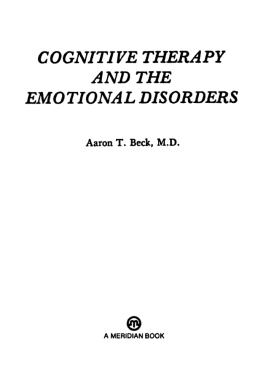I have devoted much of my professional life to a study of thinking problems in anxiety and depression, and, more recently, in panic disorders. Over several decades I have had the opportunity to treat a large number of people who had distressed marriages and a few who were living together though not married. In many cases, these troubled relationships led to depression and anxiety in one of the mates. In others, the depression and anxiety aggravated difficulties already present in the relationship.
As I turned my attention to the problems of couples, I found that they showed the same kind of thinking aberrationscognitive distortionsas did my depressed and anxious patients. Although the couples were not so depressed or anxious that they needed therapy specifically for these conditions, they were unhappy, tense, and angry. And as my patients did, they tended to fixate on what was wrong with their marriages and disregardor blind themselves towhat was good.
Fortunately, the last two decades have witnessed a rapid accumulation of knowledge about problems of the mind that has direct applications to the difficulties that intimate partners experience. This new understanding of psychological difficulties has also been applied to a wide range of disorders, including depression, anxiety, panic disorders, obsessive-compulsive disorder, and even eating disorders such as anorexia and bulimia. This approach, called cognitive therapy, is embedded within a major new movement in psychology and psychotherapy called the cognitive revolution.
The word cognitive , derived from the Latin word for thinking, refers to the ways in which people make judgments and decisions, and the ways in which they interpretor misinterpretone anothers actions. This revolution has provided a new focus on how people use their minds to solve problemsor to create or aggravate them. How we think determines to a large extent whether we will succeed and enjoy life, or even survive. If our thinking is straightforward and clear, we are better equipped to reach these goals. If it is bogged down by distorted symbolic meanings, illogical reasoning, and erroneous interpretations, we become in effect deaf and blind. Stumbling along without a clear sense of where we are going or what we are doing, we are destined to hurt ourselves and others. As we misjudge and miscommunicate, we inflict pain on both ourselves and our mates and, in turn, bear the brunt of painful retaliations.
This kind of twisted thinking can be untangled by applying a higher order of reasoning. We use such high-level thinking much of the time when we catch ourselves in a mistake and correct it. Unfortunately, in close relationshipswhere clear thinking and corrections of our errors are especially importantwe seem to be particularly defective in recognizing and rectifying our misjudgments of our mates. In addition, although partners may believe that they are talking the same language, what they say and what their mates hear are often quite different. Thus, problems in communication lead to and then aggravate the frustrations and disappointments that many couples experience.
Take the following case: Ken and Marjorie, both busy in their careers (he sold insurance, and she was a secretary in a public relations firm), had decided to spend more time together. One Saturday Marjorie told Ken of her plan to spend the afternoon shopping. Ken, wanting to be close to Marjorie, immediately decided to accompany her. Marjorie, after a particularly frustrating day reviewing the books of a large and complex company, interpreted this as an intrusion (thinking, He never lets me do my own thing .) She nevertheless said nothing to Ken and was quiet during the entire shopping expedition. Ken interpreted her silence to mean that she didnt care for his company, and he became angry at her. Marjorie reacted to his anger by withdrawing even more.
The facts of the situation were that (1) Marjorie did want to spend more time with Ken but wanted to shop alone; (2) she failed to communicate this to Ken; (3) she misinterpreted his overture as an encroachment on her freedom; and (4) Ken misinterpreted her withdrawal as a sign that she did not enjoy his company.
Numerous, repeated misunderstandings, such as those between Marjorie and Ken, and the resultant mutual anger will erode the foundation of a relationship. I have observed several times that similar misunderstandings escalate to the point of no return. What is remarkable, however, is that if partners catch the misunderstanding and correct it before it goes too far, they can head off the storm. Cognitive therapy is designed to help couples do just thatto clear their thinking and communication so as to prevent the misunderstandings from arising in the first place.
Most couples are aware that there is a continuing crisis in marriage; that between 40 and 55 percent of marriages are likely to end in divorce. As they see more and more unhappy marriages and more and more breakups, couples may wonder whether this might happen to them, too.
Newlyweds, riding the tide of love and romance, want nothing more than a successful marriage. They often believeat least initiallythat their relationship is different and that their deep love and optimism will sustain it. Sooner or later, however, all too many couples find themselves unprepared for the problems and conflicts that gradually accumulate in any marriage. They become aware of a growing unrest, frustration, and hurtoften without knowing exactly where the problem lies.
As the relationship founders in a backwash of disillusionment, poor communication, and misunderstanding, the couple may begin to think that their marriage was a mistake. Nowhere is the cry for help a therapist hears more poignant than among those clients who see their once happy marriage begin to dissolve. Even couples married thirty to forty years may feel driven to end a relationship that they now regard as an unending series of mistakes and miseries.
It is surprising in a way that so many marriages do collapse. Consider all the forces that you would expect to keep a couple together. Loving and being loved are certainly among the richest experiences that people have. Add to these the other by-products of the relationshipintimacy, companionship, acceptance, support, to name only a few. You have somebody to console you when you are bereaved, to bolster your spirits when youre discouraged, and to share your excitement when good things happen. And you have the extra bonus of sexual gratification, which nature provides as a special inducement to mate. Nor can you underestimate the satisfaction of having children and building a family together.
The hopes and encouragement of parents and other relatives, as well as the expectations of your community that you will stay together, provide pressures from the outside. With all these binding forces operating to fortify the relationship, what can go wrong? Why isnt lovelet alone all the other incentivesstrong enough to keep couples together?
Unfortunately, centrifugal forces are at work that can split a relationshipdemoralizing disillusionments, labyrinthine misunderstandings, and tortured miscommunications. Love in itself is seldom sturdy enough to resist these divisive forces and their by-products, resentment and rage. Other ingredients of a good relationship are necessary in order for love to solidify rather than start to dissolve.

